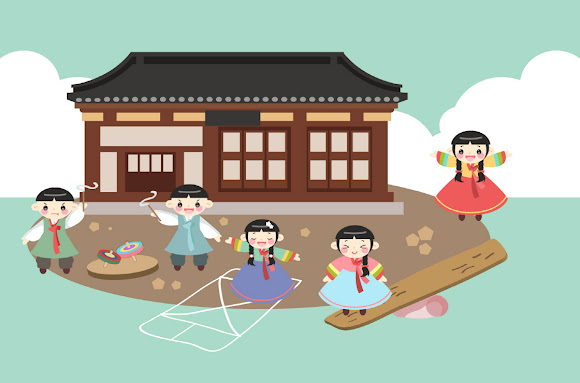Korean folk games, traditional games
Next is a folk game. Folk games have strong characteristics of seasonal games passed down to the public. It refers to festivals that combine holidays, seasonal customs, and lifestyle customs, and reflect regional characteristics, and customs and games performed by communities or households.
It is also called folk entertainment, folk entertainment, folk game, folk entertainment, and local entertainment. In addition, it is sometimes referred to as a traditional folk game due to its transmission process and records, high recognition by many people, and clear historical aspects. Folk games include Ganggangsullae, Ssireum, Jwibulnori, Chajeonnori, and Seokjeon.
Traditional games are games that have strong social customs, historical background, and characteristics passed down from ancestors, and for which historical succession or literary evidence can be found. There are Yutnori and Gonu, which have their origins in tradition, but there are also foreign games such as Baduk, Tuho, and Janggi, which have been integrated into our history and cultural life for a long time and have become traditional games.
Traditional play refers to a play that has a long history or a short time origin, but is frequently encountered in the field of life or is socially very familiar from childhood. Although it is not a widely used or known concept, it refers to play that has many social and daily life elements. Looking at the play items, it can be seen as a similar concept to traditional games, as it includes games such as jachigi, kite flying, tombstone hitting, top hitting, gonggi play, and hide and seek.
Ganggangsullae · Turtle play · Gyeokgu · Gonu · Gossaum · Golbae · Gonggi game · Gwandeung game · Military game · Swing · Black catching · Nakhwa game · Namsaengi game · Namseungdo · Sickle game · Neolttwigi · Noddari stepping · Bridge stepping · Autumn leaves play · Daljiptaeugi, Daemunnori, Ttakjichigi, Tureumnori, Masangjae, Baduk, Bangsilnori, Boating, Tombseokchigi, hopscotch, Biryeonori, Seokjeon, Seolgyeongnori, Seongbuldo, Bullfighting, Bullfighting, Tag, Towel passing, Hide and seek. · Seunggyeongdo · Ssireum · Ssangryuk · Eoreumdaeng · Yeojeongdo · Kite Flying · Yongma Play · Yongho Game · Yut Nori · Jagigi · Janggi · Jegichagi · Jojo Japgi Game · Jonggyeongdo · Juryeonggu · Tug of War · Tightrope Walking · Jwibul Nori · Jin Nori · Chajeon Play · Chojungjong Nori · Chukguk · Chunhyangi Nori · Chilgyo Nori · Takjok Nori · Talnori · Tujeon · Tuho · Top Play · Balloon Play · Archery · Hwaryu Nori · Hwajeon Nori
'Ttakjichigi', which involves putting a play stick on the ground and hitting it with another stick to pluck it when it turns over, 'Kite Flying', and 'Jachigi', which involves hitting a shorter wooden stick with a long wooden stick and competing by measuring the distance it flies, and spinning it by hitting a top with a stick. 'Top-chigi', a step-by-step method of 'Gonggi Play', which involves spreading the balls on the floor, throwing one ball up, picking up the remaining balls, and then catching the thrown balls before they fall, jegichagi, tag, towel-spinning, Hide and seek, 'Boseokchigi', which involves putting a flat stone the size of your palm on the ground and throwing another stone to knock it down, 'Hopscotch', which involves drawing a game board on the ground, and a boy's game where glass beads are thrown on the ground and matched with other beads to catch them. I have many memories from my childhood, including ‘playing marbles’.




댓글
댓글 쓰기